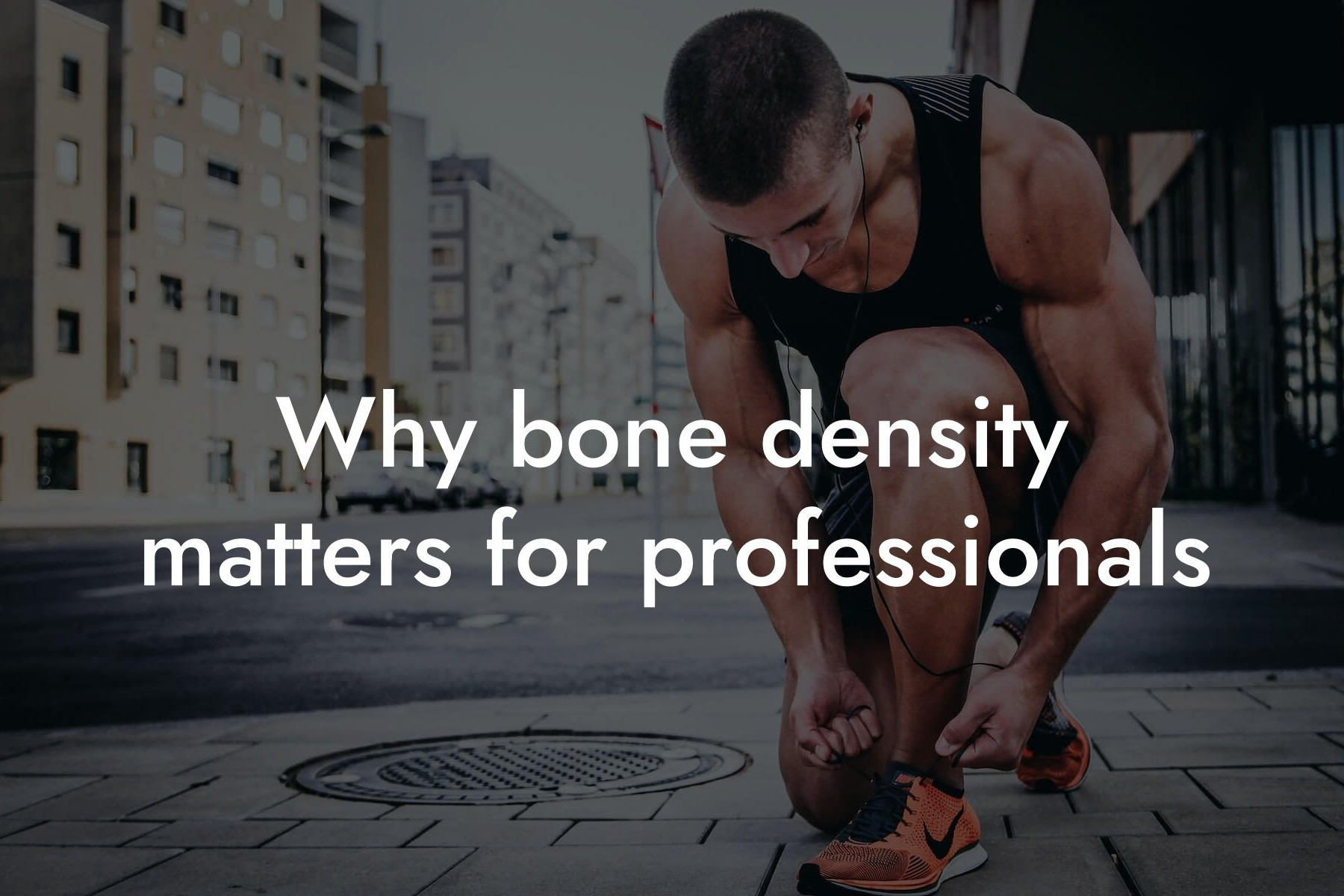As high-earning professionals, you understand the importance of maintaining a healthy physique and overall well-being. One crucial aspect of this is bone density, which can be significantly affected by stress. At Tano Performance Group, we're committed to providing you with comprehensive information on how stress affects bone density, and what you can do to mitigate its impact.
Table of Contents
- The Connection Between Stress and Bone Density
- The Science Behind Stress-Induced Bone Loss
- The Impact of Chronic Stress on Bone Density
- The Role of Cortisol in Bone Density
- Managing Stress to Protect Bone Density
- DEXA Scans: A Comprehensive Solution for Monitoring Bone Density
- Taking Control of Your Bone Health
- Frequently Asked Questions
The Connection Between Stress and Bone Density
Stress is a natural response to perceived threats or challenges, triggering the release of hormones like cortisol and adrenaline. While these hormones help you respond to immediate threats, chronically elevated levels can have detrimental effects on your bone health. Research has shown that prolonged stress can lead to a decrease in bone density, making you more susceptible to osteoporosis, fractures, and other bone-related disorders.
The Science Behind Stress-Induced Bone Loss
When you're stressed, your body's "fight or flight" response is activated, diverting energy and resources away from non-essential functions like bone growth and maintenance. This can lead to an imbalance in the delicate balance between bone resorption (breakdown) and bone formation. As a result, your bones may become weaker and more prone to damage.
Additionally, stress can disrupt the body's natural production of osteoblasts, the cells responsible for bone formation. This can further exacerbate bone loss, making it essential to manage stress levels to maintain healthy bone density.
The Impact of Chronic Stress on Bone Density
Chronic stress can have a profound impact on bone density, particularly in high-earning professionals who often face intense pressure and deadlines. Prolonged exposure to stress hormones can lead to:
- Increased bone resorption, resulting in weaker bones
- Decreased bone formation, making it harder for bones to repair and rebuild
- Imbalanced calcium and vitamin D levels, further compromising bone health
- Increased risk of osteoporosis, fractures, and other bone-related disorders
The Role of Cortisol in Bone Density
Cortisol, often referred to as the "stress hormone," plays a significant role in the body's response to stress. While cortisol is essential for responding to immediate threats, chronically elevated levels can have devastating effects on bone density.
Cortisol can:
- Suppress osteoblast activity, reducing bone formation
- Increase osteoclast activity, promoting bone resorption
- Disrupt the body's natural calcium and vitamin D balance, further compromising bone health
Managing Stress to Protect Bone Density
Fortunately, there are several strategies you can employ to manage stress and protect your bone density:
- Engage in regular exercise, such as yoga or meditation, to reduce stress and promote relaxation
- Prioritize sleep, aiming for 7-9 hours of restful sleep per night
- Maintain a balanced diet rich in calcium, vitamin D, and other essential nutrients
- Consider stress-reducing supplements like ashwagandha or omega-3 fatty acids
DEXA Scans: A Comprehensive Solution for Monitoring Bone Density
At Tano Performance Group, we understand the importance of monitoring bone density to prevent stress-induced bone loss. Our DEXA machine provides a comprehensive body assessment, giving you a detailed picture of your bone density and overall health.
With our DEXA scans, you'll receive:
- Accurate measurements of bone density and body composition
- Personalized recommendations for improving bone health and reducing stress
- Ongoing support and guidance from our team of experts
Taking Control of Your Bone Health
As a high-earning professional, you understand the importance of taking control of your physical health. By understanding the impact of stress on bone density and taking proactive steps to manage stress, you can protect your bones and maintain optimal health.
At Tano Performance Group, we're committed to providing you with the tools and resources you need to succeed. Contact us today to schedule your DEXA scan and take the first step towards a healthier, stronger you.
Frequently Asked Questions
What is bone density, and why is it important?
Bone density refers to the measure of how dense and strong your bones are. It's an important indicator of overall health, as strong bones support our bodies and protect our organs. Maintaining good bone density is crucial, especially as we age, to prevent osteoporosis, fractures, and other bone-related disorders.
How does stress affect bone density?
Chronic stress can negatively impact bone density by increasing the production of cortisol, a hormone that breaks down bone tissue. This can lead to a decrease in bone density, making bones weaker and more prone to fractures.
What are the signs and symptoms of low bone density?
Low bone density often presents with no symptoms in the early stages. However, as it progresses, you may experience back pain, stooped posture, or a loss of height. In severe cases, it can lead to osteoporosis, which can cause frequent fractures, especially in the hips, spine, and wrists.
How is bone density measured?
Bone density is typically measured using a dual-energy X-ray absorptiometry (DXA) scan. This non-invasive test uses X-rays to measure the density of your bones, usually in the hip and spine.
What are the risk factors for low bone density?
Risk factors for low bone density include age, gender, family history, low body mass index, certain medications, and a diet low in calcium and vitamin D. Additionally, a sedentary lifestyle, smoking, and excessive alcohol consumption can also contribute to low bone density.
Can stress cause osteoporosis?
While stress alone cannot directly cause osteoporosis, chronic stress can contribute to it by disrupting hormone balances, including cortisol and adrenaline. This can lead to bone loss and an increased risk of osteoporosis.
How does cortisol affect bone density?
Cortisol, often referred to as the "stress hormone," can break down bone tissue and inhibit the production of osteoblasts, the cells responsible for bone formation. Prolonged exposure to high cortisol levels can lead to a decrease in bone density.
What is the link between adrenal fatigue and bone density?
Adrenal fatigue, a condition characterized by chronic stress and fatigue, can disrupt hormone balances, including cortisol and adrenaline. This can lead to bone loss and a decrease in bone density.
Can exercise help improve bone density?
Yes, regular exercise, especially weight-bearing and resistance exercises, can help improve bone density. Exercise stimulates the production of osteoblasts, which helps to build strong bones.
What types of exercise are best for bone density?
Weight-bearing exercises, such as running, jumping, and weightlifting, are excellent for improving bone density. Resistance exercises, like push-ups and squats, can also help. Additionally, high-impact exercises, such as tennis and basketball, can be beneficial.
How does nutrition impact bone density?
A diet rich in calcium, vitamin D, and other essential nutrients is crucial for maintaining strong bones. A deficiency in these nutrients can lead to a decrease in bone density.
What foods are rich in calcium?
Foods rich in calcium include dairy products, leafy greens like kale and spinach, fortified plant-based milk, and calcium-set tofu.
What is the recommended daily intake of calcium?
The recommended daily intake of calcium varies by age, but generally ranges from 500-1,200 mg per day. It's essential to consult with a healthcare professional to determine your individual needs.
How does vitamin D impact bone density?
Vitamin D plays a crucial role in calcium absorption and bone health. A deficiency in vitamin D can lead to a decrease in bone density and an increased risk of osteoporosis.
What are the sources of vitamin D?
Vitamin D can be obtained through sunlight exposure, supplements, and fortified foods like milk, cereal, and orange juice.
Can stress management techniques help improve bone density?
Yes, stress management techniques, such as meditation, yoga, and deep breathing exercises, can help reduce cortisol levels and promote overall health, including bone health.
How does sleep impact bone density?
Adequate sleep is essential for bone health, as it allows your body to repair and regenerate bone tissue. Chronic sleep deprivation can disrupt hormone balances and lead to a decrease in bone density.
What is the relationship between thyroid function and bone density?
An underactive thyroid gland (hypothyroidism) can lead to a decrease in bone density, while an overactive thyroid gland (hyperthyroidism) can cause an increase in bone loss.
Can hormone replacement therapy (HRT) affect bone density?
HRT, especially estrogen replacement therapy, can help improve bone density in postmenopausal women. However, it's essential to consult with a healthcare professional to determine the risks and benefits of HRT.
How does smoking affect bone density?
Smoking can reduce bone density by decreasing blood flow to the bones, leading to a decrease in osteoblast activity and an increase in bone loss.
Can bone density be improved at any age?
Yes, bone density can be improved at any age through a combination of a healthy diet, regular exercise, stress management, and adequate sleep. However, the earlier you start, the better.
What are the treatment options for low bone density?
Treatment options for low bone density include lifestyle changes, such as diet and exercise modifications, as well as medications like bisphosphonates and hormone replacement therapy. It's essential to consult with a healthcare professional to determine the best course of treatment.
Can bone density be reversed?
While bone density loss can be slowed or stopped, it's often difficult to completely reverse. However, with early intervention and a comprehensive treatment plan, it's possible to improve bone density and reduce the risk of osteoporosis.
How often should I get my bone density tested?
The frequency of bone density testing depends on your age, health status, and risk factors. Generally, women over 65 and men over 70 should get tested every 2-3 years. Consult with a healthcare professional to determine the best testing schedule for you.
What can I do to maintain good bone density?
To maintain good bone density, focus on a balanced diet rich in calcium and vitamin D, engage in regular exercise, manage stress, get adequate sleep, and avoid smoking and excessive alcohol consumption. Consult with a healthcare professional to create a personalized plan.
Here are some related articles you might love...
- The link between bone density and long-term health
- Why bone density matters for professionals
- Bone density and aging: What professionals need to consider
- How to improve bone density naturally
- Understanding osteoporosis and its risks
- DEXA scan for bone density: What you need to know
- The role of calcium and vitamin D in bone health
- Best exercises for increasing bone density
- Nutrition tips for stronger bones
Zak Faulkner
Zak Faulkner is a leading authority in the realm of physical health and body composition analysis, with over 15 years of experience helping professionals optimise their fitness and well-being. As one the experts behind Tano Performance Group, Zak has dedicated his career to providing in-depth, science-backed insights that empower clients to elevate their physical performance and overall health.
With extensive knowledge of DEXA technology, Zak specializes in delivering comprehensive body assessments that offer precise data on body fat, muscle mass, bone density, and overall physique. His expertise enables individuals to make informed decisions and achieve their fitness goals with accuracy and confidence. Zak’s approach is rooted in a deep understanding of human physiology, combined with a passion for helping clients unlock their full potential through personalised strategies.
Over the years, Zak has earned a reputation for his commitment to excellence, precision, and client-focused service. His guidance is trusted by top professionals who demand the best when it comes to their health. Whether advising on fitness programs, nutritional strategies, or long-term wellness plans, Zak Faulkner’s insights are a valuable resource for anyone serious about taking their health and fitness to the next level.
At Tano Performance Group, Zak continues to lead our Content Team revolutionising how professionals approach their physical health, offering unparalleled expertise that drives real results.




